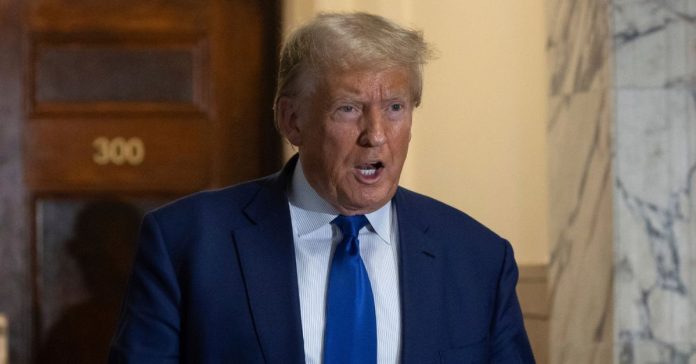A federal judge denied Donald Trump‘s motion to dismiss his indictment, charging him with criminal conduct during the last days of his presidency.
In denying Trump’s effort to dismiss the charges against him, arguing presidential immunity and constitutional grounds, Judge Tanya Chutkan, who’s overseeing his 2020 election subversion case, said his four-year service as commander-in-chief did not “bestow on him the divine right of kings to evade the criminal accountability that governs his fellow citizens.”
“No man in this country,” not even the former President, “is so high that he is above the law,” she said in the ruling. “Whatever immunities a sitting President may enjoy, the United States has only one Chief Executive at a time, and that position does not confer a lifelong ‘get-out-of-jail-free’ pass.”

Former President Donald Trump arrives at the courtroom for his civil business fraud trial at New York Supreme Court, Wednesday, Oct. 25, 2023, in New York. (AP Photo/Yuki Iwamura)
A Trump campaign spokesperson said in a statement Friday that Trump “will keep fighting for America and Americans, including by challenging these wrongful decisions in higher courts.”
“Radical Democrats, under the direction of Crooked Joe Biden, continue to try and destroy bedrock constitutional principles and set dangerous precedents that would cripple future presidential administrations and our country as a whole, in their desperate effort to interfere in the 2024 Presidential Election,” the spokesperson said.
Court documents said Trump contended the charges are based on his “public statements and tweets about the federal election and certification,” “communications with the U.S. Department of Justice about investigating elections crimes and possibly appointing a new Acting Attorney General,” “communications with state officials about the federal election and the exercise of their official duties with respect to the election,” “communications with the Vice President and Members of Congress about the exercise of their official duties in the election-certification proceedings,” and “organizing slates of electors as part of the attempt to convince legislators not to certify the election against defendant.”
“Those generalized descriptions fail to properly portray the conduct with which he has been charged,” the court wrote in its decision.
The indictment said that “Despite having lost” the 2020 election, he “was determined to remain in power,” so “for more than two months following election day on November 3, 2020, the Defendant spread lies that there had been outcome-determinative fraud in the election and that he had actually won.”
He “knew that [those claims] were false” but “repeatedly and widely disseminated them anyway — to make his knowingly false claims appear legitimate, create an intense national atmosphere of mistrust and anger, and erode public faith in the administration of the election,” the court document continued. “In fact, the Defendant was notified repeatedly that his claims were untrue — often by the people on whom he relied for candid advice on important matters, and who were best positioned to know the facts and he deliberately disregarded the truth.”
Have a tip we should know? [email protected]

